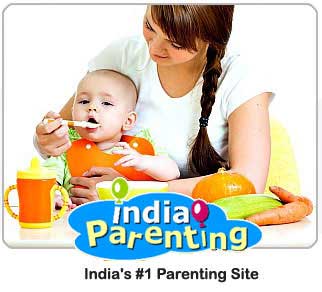Vegetables are started as weaning foods after fruits. Vegetables should be cooked well, mashed in a blender before feeding the child. Vegetable fibre is nutritious so it should be retained later on when the child is 7 months old. Additives such as ghee, oil can be added to enhance the flavour.Mashed, Well-Cooked Vegetables
Here is how you can introduce vegetables in your baby’s diet.
Method of Preparation
Vegetables should first be boiled, then mashed in a blender, and then strained. It is important to strain the vegetables until the baby is about 7 months old. After the baby is 7 months, straining is not required because vegetable fibre is very nutritious and contains certain useful nutrients.
Quantity of Feed
Begin
feeding the child with a couple of spoons and then gradually increase the quantity every succeeding week to the limit accepted by the baby. Dark green leafy vegetables, carrots and pumpkin are very healthy.
Salt, Butter and Other Additives
There is no need to add salt to the vegetables, since there is enough sodium in the vegetables. The baby's system is not ready to handle too much salt in the first few months of life. Ghee, butter or cooking oil can also be added for flavour as well as for calories.
Iron and Vitamin C
Vegetables like spinach are high in iron. In order to improve the absorption of iron into the baby's system, you need to give vitamin C. Vegetables like tomato and cauliflower contain vitamin C and therefore can be a good complement to spinach. Multivitamin drops (which are prescribed by your baby’s paediatrician) also contain vitamin C and can be given once a day, right after a meal.
Best Vegetables for Babies
Here is a list of best vegetables and their health benefits for babies. You must consult your baby’s paediatrician before including any of these vegetables in your baby’s diet.
Carrots
Carrots are rich in vitamin A, B and C. They are also rich in calcium which can help the bones of babies to grow stronger. They are also good for baby’s eyesight. Various nutrients in carrots also help to boost the overall immune system of babies. You can feed carrots to your baby after boiling and mashing them. Due to it natural sweet flavour there is no need to add any
additives to it.
Sweet Potatoes
Sweet potatoes are a rich source of vitamin C and beta carotene. They are high in fibre and also help to boost the immune system of babies. They are easy to boil and mash and your baby will surely love its sweet taste. Its high fibre content makes it easier for babies to digest.
Pumpkin
Pumpkin is high in fibre as well as loaded with lot of nutrients. It is rich in nutrients like iron and vitamin C. It can be included in the diet of babies who are more than 6 months old.
Cauliflower
Boiled and mashed cauliflower can be given to the babies who are over 8 months of age. This vegetable is rich in vitamin C and K. Steaming is also a good option to provide its maximum health benefits to your baby. You must make sure that it is properly cooked and mashed well before giving it to your baby.
Other Vegetables for Older Babies
Here is list of vegetables that can be boiled and
pureed for babies who are more than 8 months old.
- Potato
- Spinach
- Beetroot
- Broccoli
When you are introducing vegetables in your baby’s diet, you must consult your baby’s paediatrician. Ask your baby’s paediatrician about the vegetables that should be introduced first and the ones which should be introduced later on. Your doctor may suggest you include the vegetables that are easy to digest for your baby in the beginning. Make sure that the vegetables that you buy for your baby are clean and fresh. Wash and clean the vegetables carefully before you cook and mash them for your baby. Always feed the freshly cooked and properly mashed vegetables to your baby to avoid
choking hazards.
































